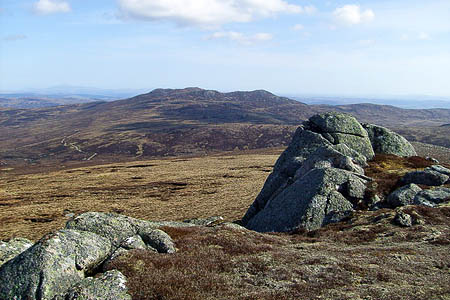
The site near Carn nan Lochan where the Glenmorie turbines would have been built. Photo: Rob Woodall CC-BY-SA-2.0
Mountaineers have welcomed a council’s decision to reject plans for two large windfarms in the Highlands.
The Mountaineering Council of Scotland has objected to both developments, at Glenmorie and Dalnessie, on the grounds they went against Highland Council’s policies and development plans.
It welcomed today’s decision on the proposals to build 34 turbines and 35km (22 miles) of access track at Glenmorie, north of Dingwall, and 27 turbines and 20km (12 miles) of track on the Dalnessie site, north-east of Lairg.
MCofS chief officer David Gibson said: “We objected to these industrial-scale proposals on the grounds that they were inappropriate developments which contravened Highland Council planning policy; they would have a significant visual impact on the mountains and other wild land, and adversely affect a broad swathe of Scotland’s finest landscapes.
“We believe that members of the planning committee have acted in the best interests of their constituents, and in the broader public interest, as custodians of some unique and very special landscapes.
“However, we still fail to understand why Highland Council planning officials originally recommended that the council should ‘raise no objection’ to Glenmorie and Dalnessie, given their own policy and the obvious and intrusive impact on recognised and designated landscape areas.
“The MCofS is not opposed to onshore wind farms and we have objected to only 6 per cent of the onshore developments tracked by Scottish Natural Heritage.
“We seek protection for the mountains through changes to Scottish Government planning policy. We have called repeatedly for the introduction of a national spatial planning policy for onshore wind farm developments which would give protection to precious mountain landscapes and at the same time offer developers guidance on where wind farms could be located.
“The present planning free-for-all, which encourages inappropriate and speculative developments, and in which the Scottish Government is placing unreasonable pressure on local authorities to process and approve developments, is not a recipe for success.
“The Scottish Government, despite their repeated and empty assurances that such protection exists, must act to provide protection for our superb landscapes.
“Given this is the Year of Natural Scotland, we believe that is the minimum they should do.”
